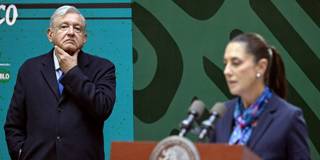For over a century, incoming Mexican presidents have fended off powerful predecessors who tried to continue to wield power. Whether Claudia Sheinbaum can do the same with her mentor, the divisive populist Andrés Manuel López Obrador, will determine her presidency’s success.
MEXICO CITY – When Andrés Manuel López Obrador was elected president of Mexico in 2018, the question was which AMLO – as he is commonly known – would govern. Would he be the pragmatic politician who had pledged fiscal rectitude, advocated free trade, and supported an independent central bank? Or would he be a populist leader who, like the authoritarian Institutional Revolutionary Party (PRI) of the 1970s and 1980s, would seek to co-opt voters through enormous social programs and giveaways and expand the role of state enterprises?

MEXICO CITY – When Andrés Manuel López Obrador was elected president of Mexico in 2018, the question was which AMLO – as he is commonly known – would govern. Would he be the pragmatic politician who had pledged fiscal rectitude, advocated free trade, and supported an independent central bank? Or would he be a populist leader who, like the authoritarian Institutional Revolutionary Party (PRI) of the 1970s and 1980s, would seek to co-opt voters through enormous social programs and giveaways and expand the role of state enterprises?